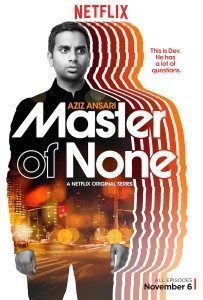Master of None
Cast: Aziz Ansari, Noël Wells, Eric Wareheim, Lena Waithe
Created by: Aziz Ansari, Alan Yang
Episodes: 10
Genres: Comedy-drama
Rating: ★★★★☆
Review Spoilers: Medium
Netflix | IMDB
Halfway through the second episode of Aziz Ansari’s new Netflix show Master of None, I looked to the other side of my couch and saw that my girlfriend was crying. The episode hadn’t gotten into particularly heavy or depressing subject matter; in fact, I’d been laughing my ass off through most of it. But my girlfriend is Indian American with immigrant parents, and she told me that after a lifetime of widely consuming media of both American and Indian origin, she could see her family, her story, on screen for the first time ever.
Master of None thrives in this ability to authentically depict what most modern television has failed to capture in our lives. And not just for Indians, though Ansari might be the first one ever to star in an American sitcom, let alone frame the immigrant diaspora experience and the lack of diversity in the entertainment industry as central themes.
But its larger subject is more universal: the life of a modern New York adult-in-training, with all the confused romantic intentions, the balance of legitimate struggle and enormous privilege, the now-unavoidable reliance on social media, the insecurity, the existential dread, the tacos. It’s like Girls, but without pretense and with a self-awareness of its narcissistic characters.
![[Netflix]](http://www.nerdophiles.com/wp-content/uploads/2015/11/master-parents-470x197.png)
How do Ansari and co-creater Alan Yang portray the “young person finds him/herself” story, the constant focus of novels and indie films, with more grace and insight than almost any other TV comedy? Because it uses that genre distinction merely as a suggestion and finds no fault in straight up not being funny at times. The show prioritizes its characters over its humor, so when the jokes do come, they work all the better.
Take “Nashville,” the mid-season centerpiece, in which Dev and Rachel visit Nashville for a weekend as their first official date. The result plays out more like a Richard Linklater movie than a typical sitcom – the two wander around the city, forming inside jokes, talking about their pasts, and processing the new experiences together.
Ansari and Wells have an absorbing chemistry, and we see every step of the characters melding together and falling in love, all the more because we also see the moments where they don’t click, when they share an awkward silence or have to admit to their mistakes. The same goes for the season’s other high point, “Mornings,” in which Rachel moves in with Dev and the two inherently butt heads more often than they expected. Both episodes depict these experiences in the realest ways it can, simply to show all that is difficult, but ultimately beautiful, about each.
![[Netflix]](http://www.nerdophiles.com/wp-content/uploads/2015/11/master-pasta-470x197.png)
Thus, it’s all the more disappointing when the show strays from this established tone in favor of something less believable for the sake of comedy. Dev’s best friend Arnold, (played by Eric Wareheim of Tim & Eric), stands out like a sore thumb here as the oddball nerd, the Kramer of a group that doesn’t particularly need one.
This goes doubly for Colin Salmon’s fictionalized version of himself as the star of one of Dev’s movies, an eccentric to the point of near insanity who builds an elaborate tribute to his deceased cat out of falling dominoes and thinks everything Dev says is brilliant. These more outlandish elements are funny in their own right, but they feel like they belong to a different show.
![[Netflix]](http://www.nerdophiles.com/wp-content/uploads/2015/11/master-party-470x197.png)
Take the first episode, “Plan B,” in which Dev has to watch his friend’s kids for a few hours. The task quickly transitions from fun to exhausting, and by the end of it, Dev’s considerations of fatherhood have effectively fallen apart. All of this is conveyed to us on screen… and yet Dev has separate conversations with three different characters about it, none of which significantly contribute to what we already know.
Still, these are just the problems that will naturally trouble any comedy in its first season, still attempting to find its groove. Louie, the show that bears the greatest resemblance to Masters of None, had the same problems with tone and pacing in its first season before it cleaned up its act and became one of the best shows on television. Ansari’s still learning how to run TV on the production and writing end, but his work so far shows incredible promise.
Final Thoughts: Masters of None might be the smartest, most honest, and overall best new show we’ve seen all year. It feels like a culmination of Aziz Ansari’s entire career, a crystallization of all he’s attempted to explore in his standup, delivered with maturity and plenty of great humor (but not too much).
